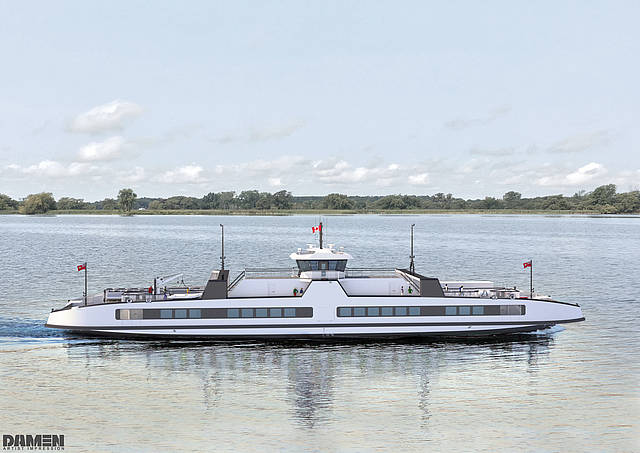
Amherst Island will be propelled by four SCHOTTEL Twin Propellers STP 260 FP each with an input power of 550 kW.
SCHOTTEL has signed a contract with Damen Shipyards to equip the first fully-electric vessels to operate in Canada. The new Amherst Island and Wolfe Island ferries will be propelled by four SCHOTTEL Twin Propellers STP 260 FP, each with an input power of up to 550 kW. The main propulsion is provided by batteries with a diesel engine as backup to ensure mobility. The propulsion concept implies a power intake increase up to 650 kW due to an enhanced draught provided by the batteries. In accordance with their field of operation in the Lake Ontario/St. Laurence River of the Canadian province of Ontario, the thrusters will fulfil the requirements of Ice Class 1A.
Common concept for future innovations
“There has been close cooperation with SCHOTTEL in this project that aimed at identifying high efficient future innovations and green technologies for sustainable power solutions. SCHOTTEL’s international network and propulsion knowledge that we have relied on for decades and we already have supported, made this project a comprehensive solution for the customer”, says Damen Shipyard’s Leo Postma, Area Manager Canada.
The two new double-ended ferries will be operated by MTO, the ferry service of the Ministry of Transportation of Ontario. Damen’s full electrification concept for the ferries serving Kingston and Wolfe Island, as well as Millhaven and Amherst Island, will reduce emissions by the equivalent of 7 million kg carbon dioxide per year.
Propulsion performance equals conventional concept
The Amherst Island ferry is due to be delivered in 2020. With a length of 68 m and width of 25 m, it will accommodate up to 300 people and 42 cars. The Wolfe Island ferry, scheduled for delivery in 2021, will have a length of 98 m and a width of 25 m for transporting up to 399 passengers and 75 cars. Both will operate at speeds up to 12 knots that equals the speed of conventional propulsion.